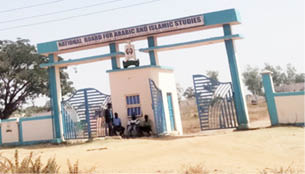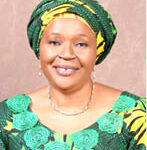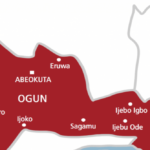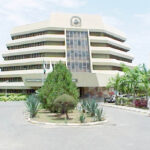The National Board for Arabic and Islamic Studies (NBAIS) is a regulatory agency that oversees thousands of schools in Nigeria. Despite the responsibilities of the body, some of the staff are thinking of taking their services elsewhere due to redundancy. This report looks at the challenges before the NBAIS and how the body has fared in its mandate.
Following the approval of the National Council on Education (NCE) at its 57th meeting in 2011, the National Board for Arabic and Islamic Studies (NBAIS) was recognised as a national examination and regulatory body that covers over 1,600 public and private schools and over 5,000 Tsangaya schools.
Since then, the board has carried out massive staff recruitment based on replacement, which actualized the employment of over 5,000 staff.
This Daily Trust Saturday investigation reveals, however, that many of the staff worked without a schedule of duty, which has in turn caused redundancy among them. The situation is also said to have left many of the workers thinking of resigning.
“I started working at the board three years ago. At the beginning, I was excited because I had just gotten a job and I was even paid my arrears of about six months, which I had worked and not been paid,” a staff who sought anonymity said.
According to the staff, “Three years into the job, I am really looking for another job because I am not learning anything here and I am not using the skills I acquired in school. I work in the headquarters and I come to work twice a week because there is nothing for me to do.”
The Daily Trust Saturday investigation also found that staff of the board in the states stayed for months without going to work, claiming they had no schedule of duty at the office.
Corroborating the claim, a newly employed staff member who also wants anonymity said, “I was posted to one of the state offices but, I was not given a work space, nor was I given a work schedule.
“After I went to the office continuously for a week without a desk and no duties were assigned to me, I decided to keep away and do my other businesses because I started resenting wanting to come to the office with no job that I was being paid for,” he said.
While some staff are concerned over redundancy, others are worried over delayed salary payments and posting one year after receiving their appointment letters.
“In December 2021, we received a text message from NBAIS inviting us to the head office in Rigachikun, Kaduna State, for biometric capture and IPPIS. But between January and April, nothing changed,” one of the affected staff members said.
The staff, however, said in May, about 300 staff from the recent recruitment were reported to have received their salaries for one month, and after a few days into June, the staff who did not get paid received a text message from the board requesting them to send a screenshot of their Integrated Personnel Payroll Information System (IPPIS) slip via WhatsApp to process their unpaid salaries.
The staff lamented that, despite complying with the directive, nothing changed and those new employees who were paid in May received their posting letters in June.
The acting registrar of the board, Professor Muhammad Shafiu Abdullahi, however, denied the claims, saying, “The board needs more staff, especially for the schools under its mandate.”
Founded by Alhaji Sir Ahmadu Bello, the Sardauna of Sokoto in 1960, it started as a board meant for the Northern region, with only a few schools and colleges operating under it. Presently, the board has a mandate to fully integrate western and Islamic education and promote Qur’anic schools and the Madrasah system of education in the country.
Among its mandates, the board is expected to, apart from conducting the national examination, also engage in quality assurance activities, mainstream and integrate government and private schools, as well as mainstream their curriculum.
Daily Trust Saturday reports that the board has come into the public eye a number of times since its establishment on issues ranging from lopsided recruitment, uneven salary structures, witch-hunting of staff and, the most recent, regarding the monies remitted to the Consolidated Revenue Fund (CRF) during the budget defence at the Senate Committee on Finance and Appropriation on September 29, 2022.
The registrar’s submission did not go down well with the committee when he claimed the board spent N8.5 billion annually on staff salaries.
Abdullahi, however, said the institution paid N30 million into the Consolidated Revenue Fund (CRF) out of the N410 million collected from state governments and private schools for the conduct of the examination.
Daily Trust Saturday, however, gathered that the board was expected to collect N490 million from the state governments, but they are yet to remit the monies to it.
Confirming the claim of non-remittance of examination fees by state governments, a management staff who confided in our correspondent said, “The non-payment of the students’ examination fees by some state governments from 2018 to 2021 has plunged the board into huge debt burdens with its contractors, and suppliers of examination materials.”
Though he did not mention the states, he said in the years under review, examiners were not paid their allowances, thereby putting the management of the board in a fix where they were only able to pay around 40% of their debt obligation.
According to the source, “A fraction of those arrears of debt owed by some state governments only came in 2022 from information available. NBAIS was able to settle some arrears of debt and conduct its June-July 2022 examination, which gulped about N85 million and still remitted about N30 million to the federal coffers.”
Responding to the allegation of redundancy and lack of office space, the acting registrar said the board is not a new establishment and it inherited over 600 staff from the Ahmadu Bello University (ABU) into the Federal Ministry of Education.
He said when the board became national, there was a need for it to have staff in its already existing state offices just like other national examination bodies, hence, the replacement of staff.
“Arabic and Islamic Institutions cannot integrate themselves into western education, only NBAIS can do that, which informed the need to attach two staff each for the over 1,600 schools and over 5,000 Tsangaya schools in 26 states and the Federal Capital Territory (FCT).”
He noted that the board does not conduct institutional or departmental examinations but a national examination, which requires a lot of manpower and resources.
Speaking on unqualified staff on the board, he said, “During the recent verification exercise, over 200 staff were found with fake certificates, and they have been dealt with accordingly. We will continue to check and phase out unqualified staff at the board as the basic qualification for staff is the National Certificate Examination (NCE).”
He said the video of the budget defence and the declaration by the chairman to raise an investigation committee were welcome developments for him, “because it gave me a good opportunity to explain myself since I cannot argue with them. Later, they realised that the amount they were quoting was wrong, what I had in my presentation was N490 million, not N412 million, and that is the money that state governments owe us, it is not in our account.”

 Join Daily Trust WhatsApp Community For Quick Access To News and Happenings Around You.
Join Daily Trust WhatsApp Community For Quick Access To News and Happenings Around You.


